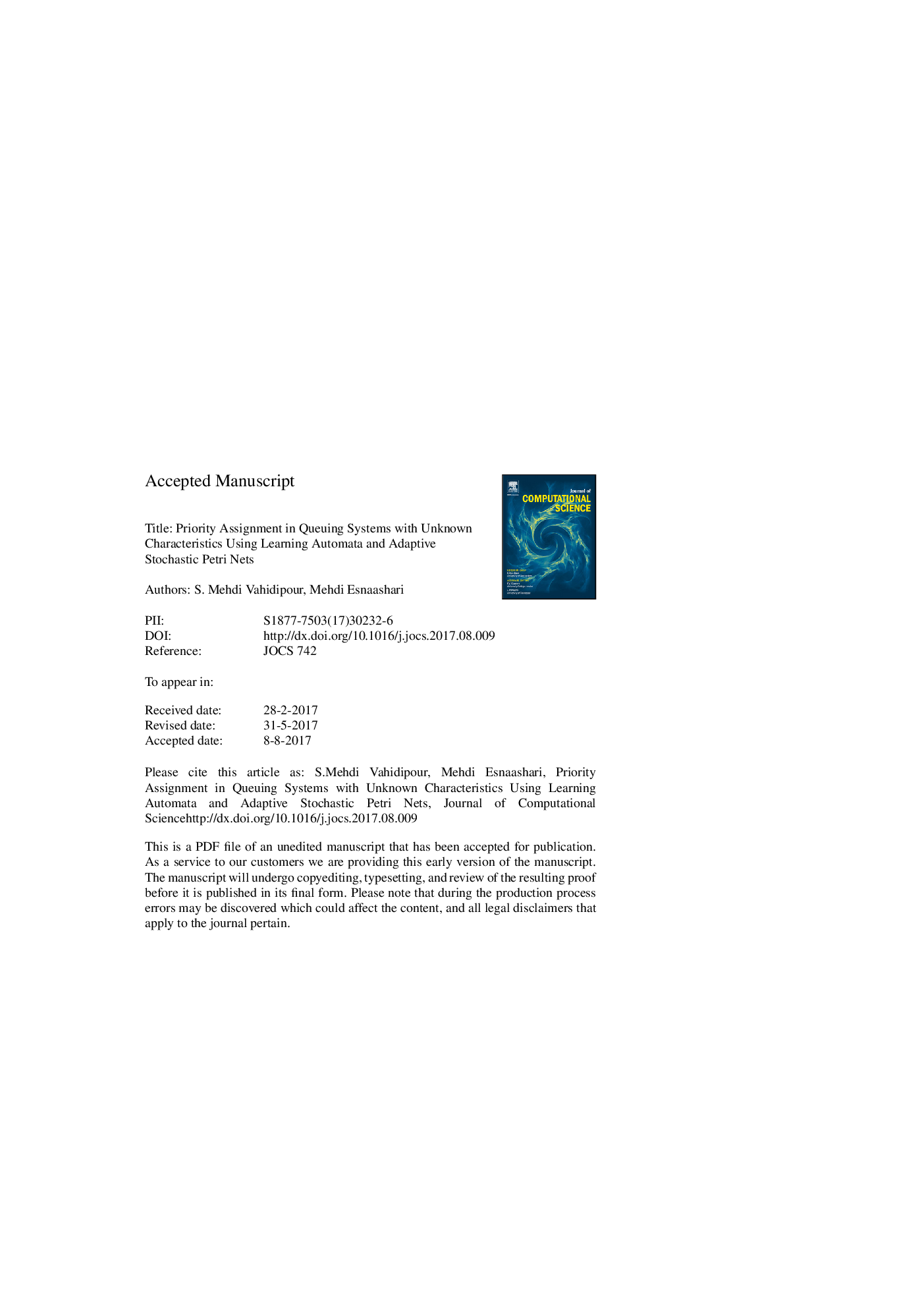| کد مقاله | کد نشریه | سال انتشار | مقاله انگلیسی | نسخه تمام متن |
|---|---|---|---|---|
| 6874464 | 1441161 | 2018 | 34 صفحه PDF | دانلود رایگان |
عنوان انگلیسی مقاله ISI
Priority assignment in queuing systems with unknown characteristics using learning automata and adaptive stochastic petri nets
ترجمه فارسی عنوان
تخصیص اولویت در سیستم های صف بندی با ویژگی های ناشناخته با استفاده از اتوماسیون اتوماتیک و شبکه های تصادفی
دانلود مقاله + سفارش ترجمه
دانلود مقاله ISI انگلیسی
رایگان برای ایرانیان
کلمات کلیدی
تخصیص اولویت، تخصیص اولویت احتمالی، سیستم صف بندی با مشخصات ناشناخته، اتوماتیک یادگیری، شبکه تصادفی تصادفی پتری،
موضوعات مرتبط
مهندسی و علوم پایه
مهندسی کامپیوتر
نظریه محاسباتی و ریاضیات
چکیده انگلیسی
In a queuing system with multiple queues and one server, a Priority Assignment (PA) mechanism is needed to assign the highest selection priority to the jobs from a class of jobs with the highest service rate. In this order, the shortest total waiting time of the system is achieved. The PA mechanism can be considered as an adaptive mechanism when some parameters of the queuing system, such as service rates, are unknown for this mechanism. In such queuing system, in order to the selection priorities to classes of jobs, an adaptive Probabilistic PA (PPA) mechanism can be utilized. The total waiting time of the queuing systems with unknown characteristics can be shortened by assigning the highest selection probability, rather than priority, to the jobs from a class of jobs with the highest service rate. In this paper, first Learning Automaton (LA) is introduced as an adaptive PPA mechanism in a queuing system with unknown characteristics consists of a server and m queues. Then, the proposed PPA mechanism is analyzed using a recently introduced model, which is the Adaptive Stochastic Petri Net (ASPN-LA). The results of this analysis enable us to establish a set of conditions for the termination of the adaptation in the LA-based mechanism. Thus, using this set of conditions, another adaptive mechanism is proposed, which consists of two phases: In the first phase, the LA is used to assign the selection probabilities to the classes of jobs and in the second phase, fixed levels of priorities are calculated using LA and then, instead of selection probabilistic, these priorities are used to select jobs for the service. The second phase of the mechanism is started when the proposed termination conditions are hold in the queuing system. Extensive computer simulations- reported in the paper -support the theoretical results. The results of these simulations indicate that the newly adaptive PPA mechanism with two phases is significantly better than or equal to the LA based PPA mechanism, over the average waiting time of the queuing system with three number of queues, in 86% of cases.
ناشر
Database: Elsevier - ScienceDirect (ساینس دایرکت)
Journal: Journal of Computational Science - Volume 24, January 2018, Pages 343-357
Journal: Journal of Computational Science - Volume 24, January 2018, Pages 343-357
نویسندگان
S. Mehdi Vahidipour, Mehdi Esnaashari,
